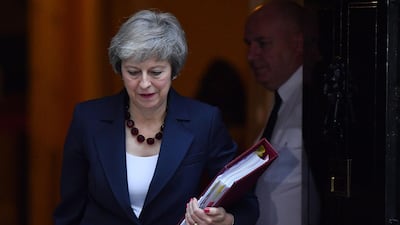Theresa May pushed back against a possible challenge to her leadership on Thursday night after two cabinet ministers and a raft of junior office holders resigned earlier in the day in protest at the deal her government struck with Brussels to leave the EU.
While the British prime minister claimed cabinet consensus behind the draft agreement on Wednesday, the hurdles to its adoption grew as politicians read the 585 pages of text and a political declaration that would underpin talks on a replacement trade deal in the years that follow the March 2019 departure.
Opposition parties and her own backbenchers have seized on two main points of contention in the draft text. The “backstop” agreement, an insurance policy to avoid a hard border between Northern Ireland and the Republic of Ireland, and a temporary customs union, which would see the UK sign up to some of Brussels’ regulations on goods and standards at least on a temporary basis.

Despite the opposition, Mrs May doubled down on the deal in a televised speech late on Thursday, insisting it would be put before the House of Commons for a vote. "This deal delivers what people voted for and is in the national interest," she said.
Angela Merkel, the German chancellor, was among European leaders who welcomed the breakthrough. "I am very happy that, after lengthy and not always easy negotiations, a proposal could be reached," Mrs Merkel said, pointing out that the threat of a no-deal exit had forced concessions from the EU. “The worst-case scenario, and the most disorderly case, would be that no deal is reached. This is an alternative we must always stay mindful of.”
European officials warned London that no better terms would be offered if politicians demanded more talks.
However, it was increasingly difficult to see how Mrs May might garner the votes required to win a parliamentary vote on the deal, anticipated for December.

The first resignation came a shade before 9am, when her Brexit secretary Dominic Raab, the man nominally in charge of the talks with Brussels, resigned saying he "cannot in good conscience support" the draft, which he claimed “threatened the integrity of the United Kingdom”.
He was soon followed by another cabinet minister, and two junior ministers. Esther Mcvey, the Work and Pensions secretary, quit and published a resignation letter warning Mrs May deal did “not honour the result of the referendum. Indeed, it doesn't meet the tests you set from the outset of your premiership.”
She reportedly clashed with Mrs May in a heated argument during Wednesday’s marathon cabinet meeting, with some reports indicating that Ms McVey was in tears at one stage.

During a three-hour appearance in the Commons, Mrs May was pilloried from all sides. “It takes back control of our borders, laws and money,” she said. “It protects jobs, security and the integrity of the United Kingdom. And it delivers in ways that many said could simply not be done.”
One of her own backbenchers, Mark Francois however urged the prime minister to “accept the political reality of the situation you now face”.
While the Northern Irish Democratic Unionist Party (DUP) keeps Mrs May’s minority Conservative government in power, its Westminster leader Nigel Dodds warned that Mrs May had not listened to its opposition. He labelled the agreement “a vote for a vassal state to break up the United Kingdom”.
Jacob Rees-Mogg, head of the influential pro-Brexit European Research Grouping of around 50 MPs, submitted a letter of no-confidence in the prime minister but the threshold for triggering a party vote of no confidence — 48 letters — was not reached to satisfy Conservative rules. “There is a genuine difference of opinion,” Sir Edward Leigh, another member of the ERG, told a meeting of about two dozen colleagues. “Because if it fails then you just strengthen her position.”

Only Sir Graham Brady, chairman of the Conservatives 1922 committee for backbench MPs, knows how many of the letters have been submitted.
The next stage, assuming Mrs May does not fall victim to a no-confidence vote from her own party, is a special EU summit on November 25 at which the remaining EU member states will vote on the proposed deal. After that will come the crunch vote in the British parliament - anticipated for December.
___________
Read more
UK pound plunges most since 2017 giving UAE residents remittance opportunity
No-deal Dover rejects Theresa May’s Brexit dreams of EU compromise
British cabinet backs Theresa May’s Brexit plan
___________
Mrs May has been left with a number glaring gaps in her cabinet to plug. Leading Brexiteer and current environment secretary, Michael Gove was reportedly offered the role of Brexit secretary. Some reports suggested he agreed to take the job only if he were permitted to renegotiate the deal himself, while the Evening Standard newspaper claimed he had flatly rejected it.
Mrs Merkel said on Thursday afternoon that the draft could not be renegotiated.
As the resignations came in, and the risks of a disorderly Brexit heightened, the pound plunged 1.8 per cent against the dollar to below $1.28 - a two-year low. An IMF report published on Wednesday warned that such a departure could hit the UK economy by as much as 5 per cent to 8 per cent of GDP.


